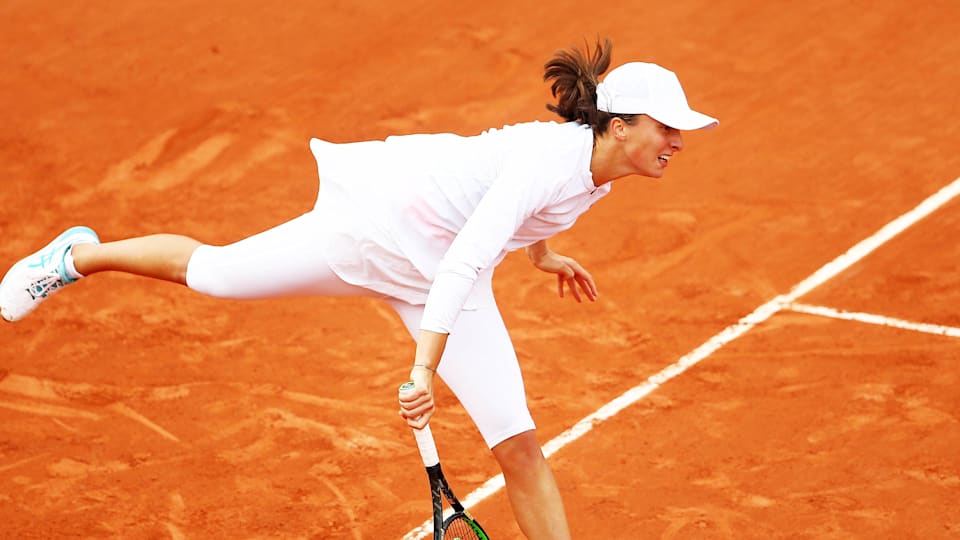Iga Swiatek: “I always dreamed of the Olympics!”
At only 19 years of age, Poland’s Iga Swiatek, ranked 54th in the world, astonished the world’s tennis experts by claiming her first Grand Slam title, without dropping a set, on the clay courts of Roland Garros. The daughter of an Olympic rower, she rose to prominence two years ago, winning doubles gold at the Youth Olympic Games (YOG) in Buenos Aires. Now, she has her sights set on Tokyo.

At the 2020 Roland Garros tournament, moved to October because of COVID-19, Swiatek was like a hurricane in the way she burst into the spotlight. Nothing bothered her: neither the rain and cold, nor her opponents. She outplayed them all, one after another, starting with Marketa Vondrousova, a 2019 finalist, in the first round (6-2, 6-1); then Simona Halep, the world no. 2 who won in Paris in 2018, with the same score; and lastly the USA’s Sofia Kenin, the winner of the last Australian Open, in the final (6-4, 6-1). She did not lose a single set in seven matches – something no one has done since Justine Hénin in 2007 – and ceded only 28 games in total to her opponents.
“I’m just proud of myself,” she said. “I’ve done a great job the past two weeks. I wasn’t expecting to win this trophy. It’s obviously amazing for me. It’s like a life-changing experience. I just feel like I kind of made history by becoming the first Polish Grand Slam winner.”
Born in Warsaw on 31 May 2001, Swiatek, a player with a great sense of game play and pinpoint accuracy, was far from a completely unknown quantity on the women’s circuit, even though she had never won a tournament. She had already made a name for herself at the YOG Buenos Aires 2018, winning doubles gold with Slovenian team-mate Kaja Juvan. On the clay of the Buenos Aires Lawn Tennis Club, they took the title in a hard-fought final against Japan’s Naito and Sato (6-7, 7-5, 10-4). A few months earlier, she had won the junior tournament at Wimbledon, dominating Switzerland’s Mirena Kung in the final (6-4, 6-2).
I won Youth Olympic Games in doubles, and it was different for me because I’m more of a singles player. That meant a lot because I was representing my country. I played with ‘Poland’ on my back, so it was amazing, but when I won Wimbledon as a junior it was a real step for me.”
With the status of Grand Slam winner, something no Polish man or woman has ever achieved, she is looking to the Tokyo Games next year with great enthusiasm. Her father Tomasz, a rower, competed at the Games in Seoul in 1988, finishing 7th in the coxless fours after being eliminated in the semi-final. The team finished 5th in the World Championships the same year.
“I always dreamed of the Olympics because of my father,” she explains. “I know it’s not the same for other tennis players, but for me, it’s really something special. I will fight for a medal.”
She will try to make the most of her experience in Buenos Aires, where she was eliminated in the singles quarter-final by France’s Clara Burel (another surprise package at this year’s French Open, finishing third), before winning the doubles with Slovenia’s Juvan.
“Next year there’s gonna be the Olympics in Tokyo. The Olympics were always important for me because my dad was an Olympian in Seoul. We were raised knowing that the Olympics are the biggest sporting event. There’s gonna be a lot of pressure, especially after my win in a Grand Slam. I’m also happy that I won the Youth Olympic Games, because I got a lot of experience.”
Even though she is still very young – the youngest Roland Garros winner since Monica Seles in 1992 – Swiatek has been working with a sports psychologist for two years: compatriot and former sailor Daria Abramowicz. And judging by her composure in the final, this work has been amazingly effective. “She understands me from A to Z and she makes me cleverer. With her it’s easier to deal with my emotions.”
She found it difficult to contain these emotions when she spoke of her father in her speech after lifting the trophy. “I think I had a mess in my head,” she explained. “But I used to talk about my dad in Polish and it would be easier for me. But he has done so much work to help me and my sister to do the things we love. He basically gave really everything. I’m just thankful for the support that he gave me.”
Now, to pay tribute to Tomasz Swiatek, she just has to continue on the road to Tokyo, where an Olympic medal would be the greatest gift that she could bring home to her father…
